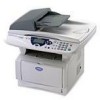Brother International DCP 8045D Network Users Manual - English - Page 23
SCO UNIX Configuration, Add Access to, Remote Printer, Printers, Print Manager, Add Remote
 |
UPC - 012502610335
View all Brother International DCP 8045D manuals
Add to My Manuals
Save this manual to your list of manuals |
Page 23 highlights
If this is the first printer configured, you must also use the lpsched command prior to the accept command. As an alternative, you may use Printer Manager in the Admintool utility under OpenWindows. Select Edit, Add, and Add Access to Remote Printer. Then enter the Print/Fax server name in the format prnservername!\prnserverservice as described above. Make sure that the printer server OS is set to BSD (the default setting), and click Add. Note that we recommend that you use the /etc/hosts file for the printer name rather than NIS or other name services. Also note that due to a bug in the Sun lpd implementation on Solaris 2.4 and earlier releases, you may experience problems printing very long print jobs. If this is the case, a workaround is to use the raw TCP port software as described later in this chapter. SCO UNIX Configuration To configure a printer in version Version 5.x of SCO Unix, use the SCOADMIN program. 1 Select Printers and then Print Manager. 2 On the menu select Printer and then Add Remote followed by Unix... 3 Enter the IP address of the Print/Fax server, and type in the name of the printer that will be used to spool to. 4 Deselect Use External remote Printing Protocol... 5 To eject the printed page, add the command rp=lpaf to the / etc/printcap file. 1 - 10 UNIX PRINTING















